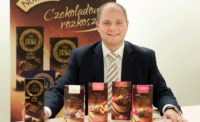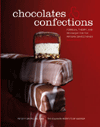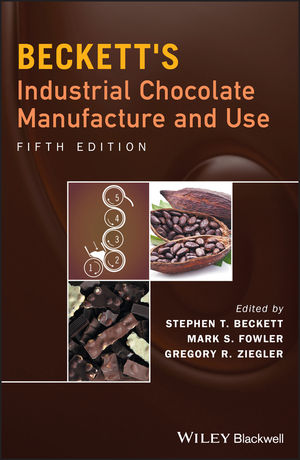At Rübezahl, Claus Cersovsky, managing director and ceo, welcomed the group warmly. After brief introductions, we were treated to a “Schwaben” lunch, which included such specialties as Maultaschen, a Schwaben ravioli. Thank you Claus for introducing me to a new local favorite.
After a wonderful lunch, Cersovsky then provided us with an in-depth overview. Known for its seasonal moulded products, the company acquired the Guborchocolate brand two years ago and posted 150 million euros in sales in fiscal 2011.
Cersovsky attributes the company’s ongoing growth to acquisitions and continued new product development.
At this year’s ISM, the company officially will roll out its breakthrough product, a gummi and chocolate bar that’s been in test markets for the past two years. Working jointly with Herbert Mederer, head of Mederer Group, which produces the famousTrolli brand gummies and jellies, the company was able to resolve tricky production issues with proprietary technology.
Initial reaction to the bar has been overwhelming and Cersovsky believes the new product promises to be an instant hit.
As expected, a tour of the facility was another example of high-end technology at work, with two Schubert pick n’ place robotic units deftly and quickly packing the company’s puffed rice chocolates, Sun Rice, into cartons at incredible speeds.
A supersized Bindler moulding machine handled chocolate bunnie production for the coming Easter season as a line of Rausch foil wrap machines pumped out the products for final hand packing in cartons.
The company continues to push the envelope to stay competitive in an already very competitive domestic and export markets. For example, Rübezhal will launch a line of Gubor products featuring Black Forest ingredients, such as fruits and milk.
It also has committed to having only UTZ-certified chocolate by 2013.
Cersovsky, together with his brother, Oliver, who oversees operations, aren’t sitting back waiting for the world to enjoy their products. They’re actively engaging retailers and consumers through a variety of means to keep both loyal to the brands.
A personal shout out to Yuliana Baranowa, our tour guide with DEULA-Nienburg Educational Centre, for exposing the group to such wonderful confectioners. Now readers can do the same. Just leave your suitcases at home.
Coppenrath
Feingebäck GmbH
Geeste, Germany
Preserving tradition,
applying technology
Although Andreas Coppenrath is a master baker – an appropriate role for a sixth-generation head of a family baking business founded in 1825 – he spends little time actually baking.
Instead, the entrepreneur spends his time on a broad range of issues and projects geared toward growing and preserving the business. As a midsized specialty baking company focused on traditional cookies, customized products and wholesale ingredients, Coppenrath Feingeback GmbH recognizes it must “honor the old, embrace the new” to compete effectively in a competitive domestic and international marketplace.
The company, which has annual revenues that top €30 million, garners half its sales from seasonal products, such as Spekulatius (German Christmas spice cookies) cookies in a range of varieties, and the remainder from Classic, “Young” Style, Finest Taste, Natural Taste and Healthy Range products.
One of the keys to Coppenrath Feingeback’s success has been its ability to maintain its heritage of high quality while taking advantage of existing technologies and still remaining flexible in production, logistics and distribution.
A walk through the company’s 17,000-sq.-meter production facility in Geeste, Germany, underscores the commitment to quality, efficiency and flexibility. For example, the company produces its own margarine as a way of controlling quality.
It has eight production lines capable of handling 150 recipes. Line 1, which is used for longer runs, can handle 18 different types of cookies. Changeovers on the line typically take only 15 minutes.
Many of the company’s packaging machines are on wheels, points out Coppenrath, which enable employees to easily switch out pack styles as necessary. Given that the company exports to more than 50 different countries globally, minimizing downtime during changeovers, be they production or packaging related, takes on even greater importance.
Being innovative and quick to market is also a key component to staying competitive, asserts Coppenrath.
Recently the company introduced an innovative “re-sealable” lid that sets its products apart from competitors.
“In Germany, consumers are very conscious about sustainability, about supporting ‘green’ products,” Coppenrath says. Although it took a while for consumers to pick up on the packages, which feature a foil-wrapped pack that includes a resealable label, it’s paid off.
So has the introduction of whole grain, all natural, gluten-free and diet or sugar-free products.
The company also has a progressive approach toward its 100 permanent workers, using a bonus/production incentive program based on daily output. It is, as Coppenrath points out, part of his father’s advice to him upon taking over the company in 1997.
“’There’s one rule in running this company, make sure the people working here are happy’ he told me.”
To that end, Coppenrath remains committed to keeping the family business a name that both employees and consumers associate with the pleasure.








